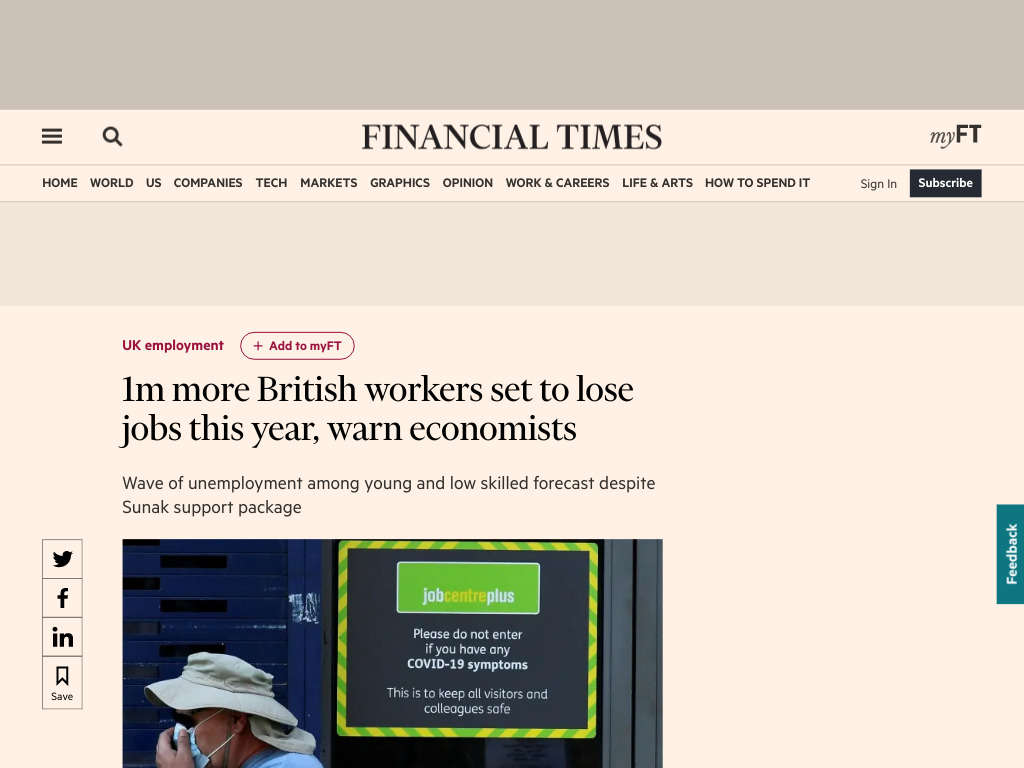A further 1m people will lose their jobs by the end of the year, with chancellor Rishi Sunak’s new work support scheme failing to stop a wave of redundancies that will hit young and low-skilled workers the hardest, economists predicted on Friday.
Mr Sunak said this week that he hoped the scheme would benefit large numbers of people by helping businesses that were “open and operating but with depressed demand” to keep employees in jobs on part-time hours after the furlough scheme ends next month.
But economists warned that Mr Sunak’s new measures would not be enough to counteract the effect of new Covid-19 restrictions on economic activity, and that the wage subsidy would make no material difference to their estimates of the likely surge in unemployment.
“I don’t think it’s a game changer,” said Kallum Pickering, an economist at Berenberg, arguing that a much more generous subsidy would have been needed to persuade employers to keep staff on over the winter amid the risks of a second lockdown.
“I don’t even think anyone will take it up,” said Fabrice Montagne, an economist at Barclays, adding that the extra costs involved for employers meant it would only make sense to use the scheme and “go the extra mile” for highly skilled workers.
There is a wide range of forecasts for the possible extent of job losses, but the Bank of England was more optimistic than many when it predicted in August that unemployment would rise above 2.5m, or 7.5 per cent of the workforce, by the end of the year.
An estimated 3m workers are still on furlough, a high proportion of them in low-wage sectors such as hospitality and leisure that are heavily affected by social-distancing rules. This has helped to limit job losses so far, with official data showing 1.4m people, or 4.1 per cent of the workforce, unemployed in the three months to July.
But the job support scheme appears unlikely to help many furloughed workers. This is partly because many businesses cannot afford to bring back workers even part time, especially in areas facing new restrictions such as the arts or the events industry. To use the scheme, employers must pay staff in full for at least a third of their normal hours.
“Yesterday was a real kick in the teeth. The only incentive we have now is to make people redundant,” said Jacqui Kavanagh, chief executive of Stamford-based Trinity Events Solutions. With her industry legally forced to stay closed, and with no help from the chancellor, Ms Kavanagh said some of her workers had been given notice on Friday, with the statutory consultation period running up to the end of the furlough in October.
The bigger issue, though, is the requirement for employers to match the government subsidy, paying a third of staff salaries for hours not worked. This will make it cheaper in many cases to employ a smaller number of full-time workers, or simply bring back people part time without using the scheme to top up their pay.
Tony Wilson, director of the Institute for Employment Studies, said the scheme could work for companies with highly skilled, long-serving or unionised staff, which would find it costly to make redundancies or train new staff later. But he said it was “inconceivable” that the take-up would match the Treasury’s projections of 2m-5m being enrolled on the scheme.
“Those firms that are most in need of immediate wage support . . . will be least likely to take it up,” he added, noting that younger staff, those with less secure contracts and the low skilled would be at greatest risk.
Torsten Bell, director of the Resolution Foundation, a think-tank, said the scheme would support companies with strong incentives to hold on to staff — for example, in skilled manufacturing jobs with high training and recruitment costs. But he added: “The problem? These are not the bulk of workers in the firing line of this crisis.”
60% of the workforce is retail
Thee country is putting economic sanctions on itself
The currency is crumbling
Major recession
Business is still leaving despite rock bottom capital
Education funds low, workforce training low
The Tories: Have you heard about our Lord and saviour austerity?


